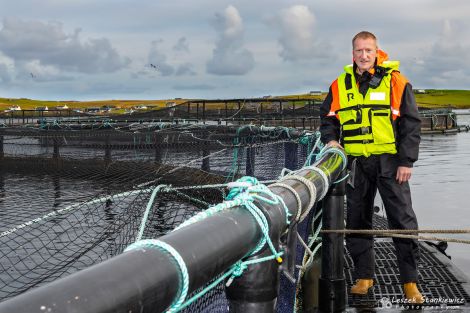Marine / Salmon industry concerned by French freight ban
Sector echoes calls for Brexit transition period to be extended
TAVISH Scott, the chief executive of the Scottish Salmon Producers Organisation, says he is “deeply concerned” for the industry’s exports to Europe after freight routes into France were blocked off for two days.
The move comes amid concern over the new variant of coronavirus in the UK, with a host of other countries temporarily suspending travel.
Last year Scottish salmon farmers exported £221 million worth of salmon to France – around 35,700 tonnes.
The Scottish Salmon Producers Organisation said it expects the government to explore “all options for resuming trade, including the testing of drivers”.
Fresh Scottish salmon worth at least £1.1 million per day is due to be impacted by French freight ban.
Former Shetland MSP Scott said the organisation is reviewing the impact on the salmon sector.
“This is the busiest week of the year with more than 150 tonnes of fresh Scottish salmon a day crossing the Channel to Europe,” he said.
“Without a resumption of trade, the Scottish salmon sector could lose £6.5 million in the days before Christmas.
“Plans for Operation Brock to prioritise perishable goods must be brought into action. That could help to alleviate some of the disruption.
“Meanwhile, it is evident that the UK Government must seek an agreement to extend the Brexit transition period. This is the only pragmatic step to take during this unprecedented turn of events with Covid-19.”
In December around 3,800 tonnes of whole fresh/chilled salmon worth £28 million is exported to the EU.
Recent figures showed that less than 20 per cent of Scottish farmed salmon is now produced in Shetland, a drop from previous years.
The decision from France to close its border with the UK for 48 hours was made on Sunday.
During this time no freight can move from the UK to France via the busy port of Dover.
Become a member of Shetland News
Traffic from France, however, can continue to come into the UK.
Added into the mix is the uncertainty over whether the UK will strike a trade deal with the EU around Brexit – with the transition period due to end on 1 January.
Scottish first minister Nicola Sturgeon has called for prime minister Boris Johnson to seek to extend the transition period due to the implications of the new strain.
The countries which have temporarily suspended flights from the UK, meanwhile, includes Germany, Italy and Ireland.
The new strain of coronavirus is said to be up to 70 per cent more transmissible, and it was a key factor behind new preventative restrictions announced by first minister Nicola Sturgeon on Saturday.
Shetland, along with Orkney and the Western Isles, is due to be placed under level three restrictions for three weeks from Boxing Day, despite no new confirmed cases for a number of weeks.
The rest of Scotland will be level four – the toughest tier of restrictions.
The new variant is more prevalent in England, but a small number of cases of the new variant has been identified in Scotland.
Sturgeon said there is a concern that it may be “driving what appears to be faster transmission in some hospitals and care homes” in Scotland.
Become a member of Shetland News
Shetland News is asking its readers to consider paying for membership to get additional perks:
- Removal of third-party ads;
- Bookmark posts to read later;
- Exclusive curated weekly newsletter;
- Hide membership messages;
- Comments open for discussion.
If you appreciate what we do and feel strongly about impartial local journalism, then please become a member of Shetland News by either making a single payment, or setting up a monthly, quarterly or yearly subscription.




























































